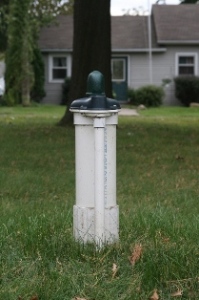Backyard wells offer safe and tasty water for millions of people—but that doesn’t mean they’re always clean. Draw on this:

When owning a well, there’s more to think about than falling down it. (via: Iowa DNR)
Approximately 43 million people in the U.S. get their water from private wells. And while most are safe, they should all be tested annually.
“Either man-made or naturally-occurring contamination can be a problem,” explains Cliff Treyens of the National Groundwater Association. “For instance, arsenic and radon occur in the geology in many areas of the country, and if it’s above a certain threshold, it could present a health risk.”
Household, agricultural, or industrial contaminants can also filter into the earth and end up in drinking water.
That’s why working with a certified water specialist to test, treat, and maintain a well is key to playing it safe with drinking water.
Get Schooled:
- Draw up the facts about private wells with this factsheet from the CDC
- Learn more about “Private Drinking Water Wells” from the US EPA
- For the Do’s and Don’ts of well owning, check out this guide from McHenry County Department of Health
The fine print:
- This segment was produced in partnership with Cornell’s Atkinson Center for a Sustainable Future




